What is Ukraine to do to get rich?
Discussing Reinert’s interview, experts concluded: the root cause of our poverty is not corruption, inadequate education, or bureaucracy but… primitive export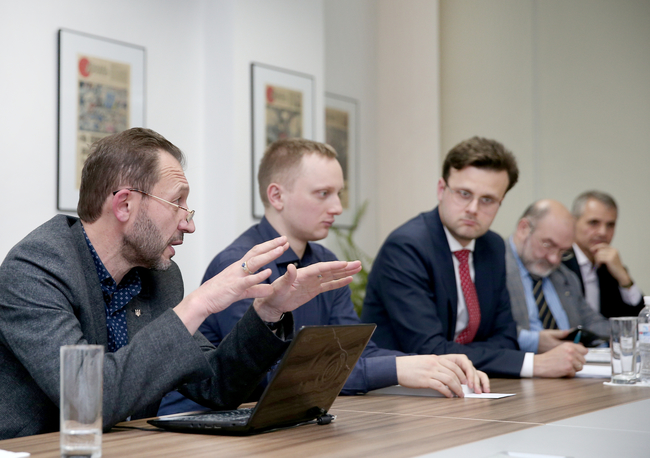
A state that has no program of industrial development of its own will end up in the trap of financial and political dependence and eventually lose its subjectness in a global game known as economic competition. This is how we can concisely sum up the opinions of the experts we invited to Den’s editorial office to discuss a much-talked-of interview with the economist Erik REINERT “Today’s Ukraine is where Peru was in 1979.”
Reinert and his opponents call them “neo-Keynesians” and “dirigistes,” respectively. One of them has confessed that he identifies himself as an ordoliberal*… But we offer you their opinions, dismissing any theories, dogmas, and cliches, and only being guided by such things as norm and common sense. After all, we are speaking not about mathematical formulas or the life of literary characters but about the real future of quite real people in a real country which “has fallen into a pit.” There is very little time to struggle out of it, and we have a more and more bitter feeling that if we do not change the tactic, we will fall so low that we will vanish from the geopolitical map.
Roman SKLIAROV:
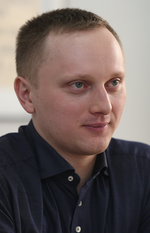 “Reinert’s advantage is that he proves his opinions with historical examples. Every country is vying today for the global sales market and for attracting capital and technologies. It is for this purpose that such institutions as export credit agencies, industrial parks, etc., are being established. The countries that are successful today have gone a certain way. Briefly, this way is rather similar for states with different mentalities, cultures, and traditions. These examples in fact help Reinert explain why he thinks that the neoliberal theory is imperfect.
“Reinert’s advantage is that he proves his opinions with historical examples. Every country is vying today for the global sales market and for attracting capital and technologies. It is for this purpose that such institutions as export credit agencies, industrial parks, etc., are being established. The countries that are successful today have gone a certain way. Briefly, this way is rather similar for states with different mentalities, cultures, and traditions. These examples in fact help Reinert explain why he thinks that the neoliberal theory is imperfect.
“We had an interesting discussion with Deputy Ministry of the Economy Maksym Nefiodov. His point of view is: ‘The economy should serve man, not the other way round.’ This is why he rejects Reinert’s concepts, for, in his opinion, the professor regards the individual as a resource for the producer. Instead, Nefiodov’s concept of ‘the economy for man’ in fact means that the consumer should be pivotal for the state. Everybody works to serve his interests. The consumer must be free to buy Italian macaroni, German cars, and American iPhones. But these things are not bought for hryvnias. We only pay Ukrainian money in our stores, but, as a matter of fact, this money is converted into the hard currency that leaves the state. And in what way can the country take hard currency? Either by earning on exports (this raises the question: what are we going to sell, how much raw material should we sell in order to buy one German car?) or by taking a loan from international financial organizations. This is the way states are driven into ‘loan slavery.’ They lose economic and then political independence. So when the man in the street says that the consumer should be pivotal, it is one thing, but if the economy minister does so, it is awful. This means that he does not know what the economy is and how it develops.”
Volodymyr PANCHENKO:
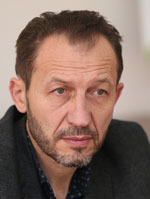 “The headline ‘Today’s Ukraine is what Peru was in 1979’ carries a very clear message. Firstly, it shows that Professor Reinert knows how to use the facts he has garnered in all of his lifetime. Secondly, he very accurately observed the similarity of historical stages and economic situations. In his article ‘To Drink or Not to Drink,’ Volodymyr Dubrovsky criticizes us, alleging that some industrialization-related reforms were carried in Peru at the time, which required protectionism. As is known, dead patients do not testify. They don’t ask the one who has died of cirrhosis whether he died so early because he had drunk heavily. They ask the one who drinks and has lived to be 100 years old. They claim this testimony is not statistical sampling. Yes, Peru received some IMF advice. And when we are speaking of tactics, we should speak about conceptual things. The IMF has always been trying out the same theory since the 1980s: suppression of the monetary basis against the backdrop of reduced consumption. Ukraine is the Peru of 1979 because its government is trying to act on the recommendations that have proved ineffective for decades.”
“The headline ‘Today’s Ukraine is what Peru was in 1979’ carries a very clear message. Firstly, it shows that Professor Reinert knows how to use the facts he has garnered in all of his lifetime. Secondly, he very accurately observed the similarity of historical stages and economic situations. In his article ‘To Drink or Not to Drink,’ Volodymyr Dubrovsky criticizes us, alleging that some industrialization-related reforms were carried in Peru at the time, which required protectionism. As is known, dead patients do not testify. They don’t ask the one who has died of cirrhosis whether he died so early because he had drunk heavily. They ask the one who drinks and has lived to be 100 years old. They claim this testimony is not statistical sampling. Yes, Peru received some IMF advice. And when we are speaking of tactics, we should speak about conceptual things. The IMF has always been trying out the same theory since the 1980s: suppression of the monetary basis against the backdrop of reduced consumption. Ukraine is the Peru of 1979 because its government is trying to act on the recommendations that have proved ineffective for decades.”
Rostyslav LUKACH:
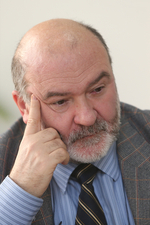 “I am a businessman. Many of my entrepreneur friends have read your interview with Professor Reinert. They have only one question: who does not agree with him? Who can disagree that it is necessary to sell finished products rather than raw materials? Who disagrees that a 5th-grade pupil must not be set against a world champion on the boxing ring? Can a country, which plays the role of this boy on the ring against an economic heavyweight state, say that we must fight on the same level and by the same rules? Let’s take a concrete example. There are two factories that make candy. One works in Hungary and the other in Ukraine. Now, Hungarian business has access to a loan at 2 percent p.a., while Ukrainian – not even at 20 percent p.a. Is it a free market for them to compete?
“I am a businessman. Many of my entrepreneur friends have read your interview with Professor Reinert. They have only one question: who does not agree with him? Who can disagree that it is necessary to sell finished products rather than raw materials? Who disagrees that a 5th-grade pupil must not be set against a world champion on the boxing ring? Can a country, which plays the role of this boy on the ring against an economic heavyweight state, say that we must fight on the same level and by the same rules? Let’s take a concrete example. There are two factories that make candy. One works in Hungary and the other in Ukraine. Now, Hungarian business has access to a loan at 2 percent p.a., while Ukrainian – not even at 20 percent p.a. Is it a free market for them to compete?
“A state must pursue its own industrial policy. Poland, Germany, and the US are doing so. A 1933 slogan: ‘Buy American first!’ It is a simple truth. No one in his senses will say: give us loans, and we will produce raw materials and sell them to you, you will process and sell them to us with an added value. Your people will have a job and wages, your budget will have taxes…
“It is a second front. And while you can see who your enemy is at the first front, you can’t do so at this one. Everybody wears a necktie and a suit and smiles. These people have created not a single job. They have been working for employers for decades and are paid with hard currency. And they dare advise us how to live properly…”
Viktor HALASIUK:
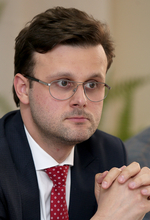 “Reinert exposes the causes of poverty in all countries, including Ukraine, mathematically precisely, like an X-ray. Now that we know this very well, we can suggest an economic policy that may change the situation.
“Reinert exposes the causes of poverty in all countries, including Ukraine, mathematically precisely, like an X-ray. Now that we know this very well, we can suggest an economic policy that may change the situation.
“The root cause of this country’s poorness and, accordingly, wealth lies in the structure of its production, in what it makes and supplies to the world. It is so simple that I’d be surprised to see someone who will dispute this. Let us cast aside all the complicated economic terminology and ask: which of the two companies will be successful – the one that manufactures ultrafast PCs or the one that produces typewriters? So Ukraine is today offering the world typewriters or even only their components at best. Nobody in the world needs them, and even if someone still does, they should be in a limited number and at a very low price. Those who oppose Reinert are in fact saying to us: it does not matter what your country will be selling to the world – raw materials or finished products, emigrants who have left their homes in search of work or the products your workers have made at enterprises. This doesn’t matter at all, for the market will decide everything for you and find you a place…
“I think it is a fundamental mistake. We can see how the market is deciding this. It is deciding in favor of the countries that pursue a targeted industrial policy. There are subjects and objects in this game. And, unfortunately, we have lost our subjectness. What is the root cause of our per capita GDP being five to six times lower than in Europe? The cause is not in corruption, an imperfect education system, or an inefficient state apparatus. These are all secondary matters in comparison with the fact that we export raw-material products of the lowest level of processing and with a negligible technological component. As time goes by, the situation continues to deteriorate. We have seen deindustrialization and further primitivization of our export basket. This in fact causes a mass-scale brain and brawn drain.
“Will the situation change by itself? Will the ‘free market” solve the problem? I am sure it will not.”
When and how do you think we took this false road? We came out of the Soviet Union which had quite a good level of industrial development. Then, as Reinert said in the first interview with Den, we began de-Communization which in fact meant deindustrialization. But there were people who attempted to have the country follow a different path. The year 1996 saw the publication of ex-prime minister Yevhen Marchuk’s book Five Years of a Ukrainian Tragedy. At approximately the same time, there was an economic conference, at which Marchuk put forward a plan of transition from governmental to private ownership. Those who remember that period claim that this very initiative cost him the office – in reality, Kuchma dismissed Marchuk from the office of prime minister not for the mythical “creation of a personal political image,” but for an attempt to introduce uniform rules into Ukrainian privatization and then the economy as a whole. Do you think there was and still is no competition of economic theories in Ukraine’s highest echelons of power, while those who stood at the helm or, to be more exact, by the feeding trough were just getting rich under the cover of liberal and neoliberal slogans? Who can counteract this now if those who wield power are disciples of that era and do not know how to administer the country differently?
Viktor HALASIUK: “I do not rule out what you are speaking about – especially after reading Jeffrey Sach’s book The Price of Civilization. The author gives the concrete names of the people who finance liberal think tanks and trends, and describes their motivation.
“But we can accuse nobody of giving us misleading advice. It is a problem for us as a nation to find a way to heed useful advice. If the IMF is giving us what we consider as bad advice but we have to follow it temporarily, we should form our own alternative in this period of time. I hate simplifications. For example, I am told: you are against the IMF. I am not against the IMF. On the contrary, I like them for helping us in a crisis situation. But our goal should be to shape, in two or three years, an economic policy that will allow us to do without IMF loans. This should be the plan of a true Ukrainian leadership.
“Germany passed this test after World War Two. The universally known Marshall Plan came to replace the Morgenthau Plan which was absolutely detrimental to the country, for it was aimed at turning Germany into an agrarian country. A less known in Ukraine but, in my view, very illustrative is the example of Japan. I recently was there. In 1947 the US occupational authorities categorically opposed the Japan Development Bank, but in 1952 the US became the main donor of this bank. Who did this depend on? Did the Americans themselves change their attitude in five years? The Japanese persuaded them to do so. They asked the Americans: do you want to see Japan as your ally, do you need a powerful ally?”
It is possible on condition that the leadership is true and patriotic. We say that practically all the former Soviet republics went through privatization. But, for some reason, only Ukraine ended up with an oligarchic clan system which neither the two Maidans nor the war shook.
Volodymyr PANCHENKO: “Not all the countries went through voucher privatization – only Ukraine and Russia did – while, for example, the Czech Republic refused to do so. As a pattern, voucher privatization sounded good. There are 52 million Ukrainians. We take the whole property, divide it into 52 million equal parts, and hand out the right of use. But when it came to practice, there emerged some ‘details’: who will evaluate this property, in what way, how will the stock market be formed, where will shares be quoted?
“Incidentally, it is the Americans that consulted the Czech Republic, as well as Ukraine, in this matter. There was a privatization office in that country. But the point is that the Czech Republic’s government aimed to sell expensively and for the money of the funds that belonged to the people.”
Rostyslav LUKACH: “We can recall the experience of various countries. For example, the Chinese had only state-run facilities. But they floated additional shares for sale. Speaking of Eastern Europe (the Baltic states and Hungary), they were selling everything. The Chinese did it on a 50-50 basis, i.e., 50 percent remains for the people and the other 50 percent are given to international corporations. In this case, the stock market increases, people receive their share, and international corporations develop new technologies. I’ve represented the interests of a US investment pool in Ukraine for many years. They are asking me all the time about how long we will be taking these loans. They are asking when they will be able just to come to Ukraine and, like anywhere else in the civilized world, open a company.
“As for the roots of this problem, I can suggest the following opinion. The root cause is in the worldview. The principle of the Soviet worldview was to put up a barrier and have a key in order to decide who can or cannot be allowed to go. Let us recall the first wave of privatization. There were not only vouchers, but also investment competitions there. And our oligarchs gained their main assets not through the voucher privatizations but through those competitions, where there was in fact no competition as such. What does the entire democratic world rest on? Moreover, what is now the mental difference between the economy of Ukraine and what Putin is doing? We let people have a choice! As a state, we can create conditions, motivations, and incentives for business – in other words, select a priority sector and set up preferences there at the initial stage. Later, when the time of the next priority comes, these preferences will go to other sectors. It is a way to manage the economy through a ‘candy,’ encouragement, rather than by way of injunction or restriction. On the other hand, some people have amassed capital in Ukraine and are now keeping it in dollars and euros. This means the worse it is in Ukraine, the better it is for them. They are really getting rich as a result of Ukraine’s impoverishment. Should the hryvnia go on falling, this oligarch will feel better. But it is a woe for the ordinary individual and the middle-scale owner. This is why it is necessary to develop the industry, which Reinert stresses. The state must offer incentives, not borders.”
Roman SKLIAROV: “It occurred to me that neoliberalism is economic Tolstoyism. The principle of Tolstoyism is nonresistance to evil. They believe one should not take into account that, as a result of neoliberalism, Ukraine is turning into a colony and a raw-material appendage. The market will allegedly strike a balance, set priorities, and so on. Incidentally, this is a common postulate of the communist and neoliberal ideologies, for the Bolsheviks also used the slogan that one must ruin everything and then everything will come up again, this time on the basis of some allegedly new and true principles. In reality, the ruination of all vertical structures will produce chaos, from which nothing good and promising will emerge by itself. There should be a reciprocal link between the state, business, and the public. It is only natural that the more developed the state is, the more complicate this system will be. In this system, the state forms the superstructure without which there will be chaos again.”
Viktor HALASIUK: “Indeed, neoliberalism is something like social Darwinism or social anarchism.
“I’d like to comment on the question of privatization. I think it is also a mental problem. Every leadership that comes to power gets down to reprivatization. But I am convinced that the country will see a burgeoning economic growth when the new leadership draws a line under all kinds of the primitive accumulation of capital. Drawing this line is followed by rather tough and universal rules of the game, which all players must obey. What is more, these rules must comprise certain motivations and incentives for the activities that are most beneficial to the state at this moment. It is, above all, high-technology sectors, engineering… Of course, proper conditions should be also created for raw-material sectors, but this must not be a top priority. The state should collect a raw-material rent and channel it into the development of the more sophisticated sectors. Following this, there will be no need to get back to the question of redistributing property. The point is that every investor is now looking at us, and if the law on special confiscation – be it right or wrong – occupies a prominent place in the political debate, this investor will begin to doubt whether it is worthwhile to invest money in our economy. MPs are not debating on how to attract foreign investments, create new jobs, and capture new markets. They are debating on how to take away and divide something. Moreover, they are taking away and dividing the old raw-material sectors which will have no prospects in the future.
“I want you to know that we have such a negligible economy that the aggregate value of all the varieties of export-oriented goods (both raw materials and finished items) is an annual 38 billion dollars. For the sake of comparison, in Poland the woodworking industry alone (!) turns out export-oriented products worth 25 billion dollars a year. I say it again that it is only one sector. Incidentally, the area of forests is the same in Ukraine and in Poland. They make goods out our forests.
“It is necessary to seek new markets, not to redistribute property.”
Mr. Vlasiuk, what kind of investors do Ukraine’s current policies and ideology attract? And what is your impression of Reinert’s book and interview?
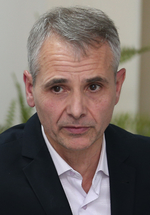 Volodymyr VLASIUK: “The problem is in the negative and skeptical attitude to the state. We began to build the state and a market economy in 1991. We had no relevant traditions. In 1991-92 Poland found Balcerowicz because it was time to dismantle the planned economy and lay the groundwork for a market economy. Balcerowicz was also doing many things at random and intuitively. But we did not do so in Ukraine. We did not introduce the basic economic freedoms that stimulate the business energy of people and create conditions for market competition. We carried out a privatization, when certain groups received private property, but we introduced no instruments of a free market. In the West, even big owners compete, while in Ukraine competition was being restrained. As a result, we received a hybrid called oligarchic economy. In this case, capitals are invested in politics. When those in whom oligarchs have invested money come to governmental institutions, they just carry out certain assignments. This vicious circle is present here, and we must break it by all means.
Volodymyr VLASIUK: “The problem is in the negative and skeptical attitude to the state. We began to build the state and a market economy in 1991. We had no relevant traditions. In 1991-92 Poland found Balcerowicz because it was time to dismantle the planned economy and lay the groundwork for a market economy. Balcerowicz was also doing many things at random and intuitively. But we did not do so in Ukraine. We did not introduce the basic economic freedoms that stimulate the business energy of people and create conditions for market competition. We carried out a privatization, when certain groups received private property, but we introduced no instruments of a free market. In the West, even big owners compete, while in Ukraine competition was being restrained. As a result, we received a hybrid called oligarchic economy. In this case, capitals are invested in politics. When those in whom oligarchs have invested money come to governmental institutions, they just carry out certain assignments. This vicious circle is present here, and we must break it by all means.
“Therefore, whenever Reinert and all that deals with public administration are criticized, this criticism in Ukraine proceeds from the abovementioned preconditions. The state has been compromised in many aspects, is heavily corrupt, and, as a result, is ineffective. So we should finish now the work which was not done in the early 1990s. But we’ve lost very much time. If we are to finish this work, we will be establishing market institutions, deregulating, privatizing, and reducing the state’s share in the economy. When we see that things are going smoothly, we will get back to the introduction of state institutions and instruments, as it is done in all the other countries. But this is a wrong approach.
“We should do all this simultaneously, for because we have lost very much time, we don’t have a sufficient margin of safety. If we take into account negative tendencies towards the reduction of the population and weakness of the economy, we must say that this country cannot possibly wait for another 10-15 years. Something may happen in the US, as a result of which it will just give up Ukraine as a bad job, something may happen to Europe. Besides, we have a neighbor that gives us ample grounds to worry. For this reason, Ukraine will either be great, have large-scale projects, strong people, and eventually a powerful economy, or will cease to exist at all. If there is no economy, there will be nothing else.
“What should we adopt first of all? We already have a history, albeit a short one, of our own economy. I can cite some successful decisions. Firstly, it is an export duty on sunflower seeds. This duty helped us launch the oil-processing industry. We are now the topmost exporter of sunflower oil. And it is without Keynes or Friedman… We just did what common sense prompts. What did people do in history when they were developing the processing industry? When Henry VI in Britain saw that the region that made woolen cloth lived better and richer that the one that only sold wool, he ordered all the regions to make cloth. It’s never too late to do the things our common sense prompts us.
“Another positive moment is a simplified system of taxation. Thus the people whom the state failed to provide with a job received an opportunity to earn by themselves. Clearly, some ‘simplified taxpayers’ performed much more operations than the law allows, but this increased the business activity of people.
“We should go on making use of these positive examples, for they are effective. For instance, following the example of sunflower oil production, we should get down to woodworking. It is necessary to ban the export of round timber. This matter is being actively torpedoed now. We know that we risk losing 600 million euro worth EU aid if we ban the export of round timber. When we make the plywood raw material, we earn 16 dollars of added value off one cubic meter. But if we make plywood out this raw material, we will earn 111 dollars of added value.
“We have certain commitments to international organizations, but we must not be servile – we must show our stand.
“A few more words about the industrial trend we have launched. It is so far a very long way to go from words to deeds. Ukraine must find a way of its own because there is no recipe that we could import from a foreign country and realize it here. In China, people wake up at five in the morning, work by the sweat of the brow, and fall asleep at midnight at best. This lets them survive. Should we blindly follow their example? No. Our people should find their own rhythm. We’d better look at how a Frenchman or a Pole lives. Why do they live like this? They have a good processing industry. Their brains work for their country.”
Volodymyr PANCHENKO: “As for intuitiveness and conceptuality, it is much more effective to know and consistently apply a theory. We have Tuhan-Baranovsky in the economic history of Ukraine. He had a lot of pupils who are being glorified today. We should also remember Sergey Witte who worked in Ukraine for a long time. When a schoolboy, Witte quoted Friedrich List and said he supported the theory of ‘reasonable tariff.’ Now ‘reasonable tariff’ can mean any wise regulatory action. For example, what can compel one oligarch or another to produce certain items? Reasonable actions. Witte had only one instrument in the late 19th century – the tariff. At first, tariffs were reduced to develop the mining industry in Katerynoslav and Uzivka. Then, when raw materials began to be successfully extracted and exported after some time, the duty on raw materials was increased but the duty on machine tools was reduced, which prompted the production of rails. Concurrently, a program of mass-scale development of railways was launched, which involved taking part in biddings. In other words, it is a pulsation of reason in compliance with realities, priorities, and the interpretation of a theory.”
P.S. We have initiated the discussion of Erik Reinert’s interview “Today’s Ukraine is where Peru was in 1979” at the request of our readers as a response to an extremely heated debate on some of the professor’s ideas, some of which we give in this article, by the Facebook community.
Economic expert Volodymyr Dubrovsky, who has called Reinert a “rogue” and his ideas harmful, has already written a column, “To Drink or not to Drink: That is the Question,” and said it is “something like the first response – not so much to the interview itself as to the reaction of seemingly wise and respectable people.” “A serious answer is in the pipeline,” the expert promised.
On the contrary, public activist Oleksii Tolkachov calls the interview “words of gold” aimed at sobering up Ukrainian society. “Neoliberalism is no less dangerous than communism. Cooperation with the IMF not only ruins Ukraine – it robs us of a prospect. Almost all that is going on in this country is a mistake. And until we regain common sense and recall our true interests, until we begin to think on our own, it is better not to have children in this country. We are in the dark so far. I can see the light, but very few are looking in my direction. The country has turned to quite a different side. Unfortunately,” Tokachov muses.
Journalist Maksym Hardus writes: “A very profound interview… Many theses discord with the views of the pseudo-liberal enthusiasts of a raw-material-based deindustrialized ‘maize republic.’”
A clearly-defined position is a rarity in our still-to-be-formed milieu. And it would be good if the debate on whether or not Ukraine should focus on industrialization, whether or not to listen to the IMF, whether to rely on a free market or to forget liberalism as a “nightmare,” penetrated into broader-than-Facebook audiences.
* Ordoliberalism (from Lat. “ordo,” order, + “liberalis,’ free) is the German branch of neoliberalism. The theory essentially boils down to the idea that the state confines itself to the formation of an economic system, while the regulation and course of the economic process occur spontaneously.
Erik REINERT, from the interview “Today’s Ukraine is where Peru was in 1979”
published by The Day in No. 61, October 20, 2016:
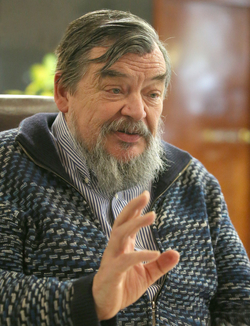 • “Industrialization cures corruption. And de-industrialization causes different types of crimes. In a sense, corruption is a substitute because there is no money to be made in the real sector.”
• “Industrialization cures corruption. And de-industrialization causes different types of crimes. In a sense, corruption is a substitute because there is no money to be made in the real sector.”
• “As long as you have ‘symmetrical free trade,’ the free trade among countries of roughly the same level of development, that’s very good. But asymmetrical trade – if you sell raw materials and import manufactured goods, like Ukraine does – is very much in the disfavor of the raw materials-producing country.”
• “In the 1970s, the most successful industrial city in Latin America was Medellin, and then there was a de-industrialization of Colombia, and Medellin is now center of drugs. So there is a link here between illegal activities and lack of legal activities. Illegal activities are to some extent caused by a lack of legal activities.”
• “The financial sector is very important as a scaffolding, as a structure supporting production. But now, Ukraine is in a situation where the financial sector becomes like a parasite. The financial sector is actually killing the real economy. And you have to put the focus back on production, and have the political will to stop listening too much to the IMF.”
• “Now is the time to ask ‘What we have been doing for 25 years? This neo-liberal dream was wrong.’ Fortunately, now also the Americans are saying it, see it as wrong. So, if this model does not even work in the United States, as the center of capitalism, how can we expect this model to work in Ukraine?”
Newspaper output №:
№65, (2016)Section
Economy





